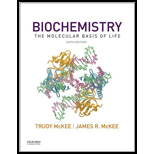
Biochemistry: The Molecular Basis of Life
6th Edition
ISBN: 9780190209896
Author: Trudy McKee, James R. McKee
Publisher: Oxford University Press
expand_more
expand_more
format_list_bulleted
Question
Chapter 12, Problem 4Q
Summary Introduction
To review:
The reason behind the possibility of ATP (adenosine triphosphate) synthesis taking place in the absence of oxygen, but no possibility of beta-oxidation in the absence of the same.
Introduction:
Glycolysis refers to the breakdown of glucose molecules to produce two molecules of pyruvate. Beta-oxidation, on the other hand, is the degradation of fatty acids. Fats are composed of a glycerol backbone and three fatty acid chains. Both glucose and fatty acids are sources of energy for the cell. ATP is the energy currency of the cell. It is mostly synthesized by the mitochondria after the ATP synthase enzyme receives electron carriers from the electron transport chain (ETC).
Expert Solution & Answer
Want to see the full answer?
Check out a sample textbook solution
Students have asked these similar questions
The intermediates of glycolysis are phosphorylated, but those of the citric acid cycle are not. Suggest a reason why.
Oxygen is not a reactant in the β oxidation of fatty acids. Can β oxidation occur under anaerobic conditions? Explain.
What would be the effect on fatty acid synthesis of a mutation in ATPcitrate lyase that reduces the enzyme’s activity? Explain.
Chapter 12 Solutions
Biochemistry: The Molecular Basis of Life
Ch. 12 - Prob. 1QCh. 12 - Prob. 2QCh. 12 - Prob. 3QCh. 12 - Prob. 4QCh. 12 - Prob. 5QCh. 12 - Prob. 6QCh. 12 - Prob. 7QCh. 12 - Prob. 8QCh. 12 - Prob. 9QCh. 12 - Prob. 10Q
Ch. 12 - Prob. 1RQCh. 12 - Prob. 2RQCh. 12 - Prob. 3RQCh. 12 - Prob. 4RQCh. 12 - Prob. 5RQCh. 12 - Prob. 6RQCh. 12 - Prob. 7RQCh. 12 - Prob. 8RQCh. 12 - Prob. 9RQCh. 12 - Prob. 10RQCh. 12 - Prob. 11RQCh. 12 - Prob. 12RQCh. 12 - Prob. 13RQCh. 12 - Prob. 14RQCh. 12 - Prob. 15RQCh. 12 - Prob. 16RQCh. 12 - Prob. 17RQCh. 12 - Prob. 18RQCh. 12 - Prob. 19RQCh. 12 - Prob. 20RQCh. 12 - Prob. 21RQCh. 12 - Prob. 22RQCh. 12 - Prob. 23RQCh. 12 - Prob. 24RQCh. 12 - Prob. 25RQCh. 12 - Prob. 26RQCh. 12 - Prob. 27RQCh. 12 - Prob. 28RQCh. 12 - Prob. 29RQCh. 12 - Prob. 30RQCh. 12 - Prob. 31RQCh. 12 - Prob. 32RQCh. 12 - Prob. 33RQCh. 12 - Prob. 34RQCh. 12 - Prob. 35RQCh. 12 - Prob. 36RQCh. 12 - Prob. 37RQCh. 12 - Prob. 38RQCh. 12 - Prob. 39RQCh. 12 - Prob. 40RQCh. 12 - Prob. 41RQCh. 12 - Prob. 42RQCh. 12 - Prob. 43RQCh. 12 - Prob. 44RQCh. 12 - Prob. 45RQCh. 12 - Prob. 46FBCh. 12 - Prob. 47FBCh. 12 - Prob. 48FBCh. 12 - Prob. 49FBCh. 12 - Prob. 50FBCh. 12 - Prob. 51FBCh. 12 - Prob. 52FBCh. 12 - Prob. 53FBCh. 12 - Prob. 54FBCh. 12 - Prob. 55FBCh. 12 - Prob. 56SACh. 12 - Prob. 57SACh. 12 - Prob. 58SACh. 12 - Prob. 59SACh. 12 - Prob. 60SACh. 12 - Prob. 61TQCh. 12 - Prob. 62TQCh. 12 - Prob. 64TQCh. 12 - Prob. 65TQCh. 12 - Prob. 66TQCh. 12 - Prob. 67TQCh. 12 - Prob. 68TQCh. 12 - Prob. 71TQCh. 12 - Prob. 72TQ
Knowledge Booster
Similar questions
- Based on your knowledge of the structure of NAD+ and an assumption that coenzyme dissociation is the rate limiting step of the alcohol dehydrogenase mechanism, hypothesize why a N249W mutation at the coenzyme binding site would increase the rate of catalysis.arrow_forwardComplete oxidation of a 16-carbon fatty acid can yield 129 molecules of ATP Study Figure 19.2 and determine how many ATP molecules would be generated if a 16-carbon fatly acid were metabolized solely by the TCA cycle, in the form of S acetyl-CoA molecules.arrow_forwardThe citric acid cycle operates only when O2 is present, yet O2 is not a substrate for the cycle. Explain.arrow_forward
- why is much of acetyl-CoA resulting from ethanol metabolism is used in fatty acid synthesis rather than cellular respiration given acetyl-CoA resulted from ethanol metabolism.arrow_forwardThe citric acid cycle itself, which is composed of enzymatically catalyzed steps, can be thought of essentially as a supramolecular enzyme. Explain.arrow_forwardExplain why people with Medium-chain acyl-CoA dehydrogenase deficiency are advised to eat a diet rich in complex carbohydrates. How is this condition normally diagnosed?arrow_forward
- How many ATP will be broken down in the complete β-oxidation of this fatty acid?arrow_forwardThe pyruvate →lactate reaction in animals is reversible, but the pyruvate → ethanol fermentation in yeast is irreversible. Explain.arrow_forwardHow many molecules of Pyruvate can form from Glycerol metabolism as a by-product of fatty acid metabolism ? Explainarrow_forward
- What structurtal property of mono- and polyunsaturated fatty acids prevents oxidation of these compounds by the β-oxidation pathway? what additional types of reactions are needed?arrow_forwardDuring glycolysis, fructose 1,6-biphosphate splits into two compounds: ______________ after reacting with aldolase and _____________arrow_forwardHow many acetyl CoA molecules can be produced during the complete β-oxidation of this fatty acid?arrow_forward
arrow_back_ios
SEE MORE QUESTIONS
arrow_forward_ios
Recommended textbooks for you
 BiochemistryBiochemistryISBN:9781305577206Author:Reginald H. Garrett, Charles M. GrishamPublisher:Cengage Learning
BiochemistryBiochemistryISBN:9781305577206Author:Reginald H. Garrett, Charles M. GrishamPublisher:Cengage Learning

Biochemistry
Biochemistry
ISBN:9781305577206
Author:Reginald H. Garrett, Charles M. Grisham
Publisher:Cengage Learning